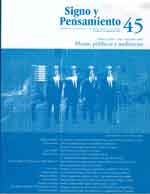Resumen
A mediados del siglo XX, la revista Semana introdujo en Colombia lso avances del periodismo estadounidense en cuanto a lenguaje, presentación y estructura empresarial, con el modelo de la revista Time. Una de las innovaciones fue la sección de los lectores, que permitió medir las reacciones y los debates originados por la agenda informativa de la revista entre sus lectores y las opiniones que circulaban en el ambiente en los tumultuosos años de la Violencia. En este epistolario aflora un país paradójico, con mentalidades contrstantes y un amplio repertorio de preocupaciones e intereses que sio circular el pensamiento crítico pese a la censura. Se revela también un inusual perfil del lector, identificado no sólo por su filiación política, sino también por su cultura, gustos, valores y creencias; con dicho perfil construimos este relato colectivo del país.Esta revista científica se encuentra registrada bajo la licencia Creative Commons Reconocimiento 4.0 Internacional. Por lo tanto, esta obra se puede reproducir, distribuir y comunicar públicamente en formato digital, siempre que se reconozca el nombre de los autores y a la Pontificia Universidad Javeriana. Se permite citar, adaptar, transformar, autoarchivar, republicar y crear a partir del material, para cualquier finalidad (incluso comercial), siempre que se reconozca adecuadamente la autoría, se proporcione un enlace a la obra original y se indique si se han realizado cambios. La Pontificia Universidad Javeriana no retiene los derechos sobre las obras publicadas y los contenidos son responsabilidad exclusiva de los autores, quienes conservan sus derechos morales, intelectuales, de privacidad y publicidad.
El aval sobre la intervención de la obra (revisión, corrección de estilo, traducción, diagramación) y su posterior divulgación se otorga mediante una licencia de uso y no a través de una cesión de derechos, lo que representa que la revista y la Pontificia Universidad Javeriana se eximen de cualquier responsabilidad que se pueda derivar de una mala práctica ética por parte de los autores. En consecuencia de la protección brindada por la licencia de uso, la revista no se encuentra en la obligación de publicar retractaciones o modificar la información ya publicada, a no ser que la errata surja del proceso de gestión editorial. La publicación de contenidos en esta revista no representa regalías para los contribuyentes.


